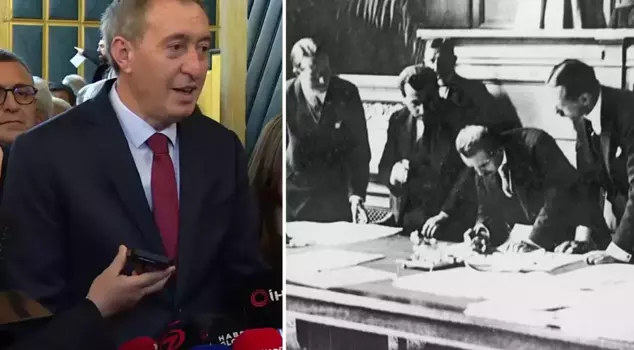
13.05.2025 15:21
Following the announcement of the PKK terrorist organization's dissolution, the statement made drew attention to references to the Treaty of Lausanne. In response to questions from the press on this matter, Tuncer Bakırhan, Co-Chair of the DEM Party, refrained from making a direct assessment regarding the references to Lausanne, stating, "If the process progresses, you can ask the relevant parties, and we will hear about it too."
The terrorism issue that Turkey has been struggling with for nearly fifty years has reached an important turning point. Following the steps taken towards the goal of a "Terrorism-Free Turkey," the 12th congress of the terrorist organization PKK was recently convened upon the call of Abdullah Öcalan. The decisions made at the meeting were officially announced today. The PKK announced that it has dissolved itself.
QUESTION TO TUNCER BAKIRHAN ABOUT LOZAN
While the repercussions of the event continue, a striking statement came from Tuncer Bakırhan, Co-Chair of the DEM Party. Responding to questions from the press after his party's weekly group meeting in the Parliament, Bakırhan also addressed the targeting of the Treaty of Lausanne, which is described as the title deed of the Republic of Turkey, in the PKK's dissolution statement. In response to the question, "What do you think about the references to Lausanne and genocide in the PKK's statement?" he replied, "If the process progresses, you can ask the interlocutors; it would be good for you; we would hear it too."
WHAT WAS SAID ABOUT LOZAN?
In the dissolution statement of the terrorist organization, it was stated, "The PKK emerged on the historical stage against the Kurdish denial and extermination policy originating from the Treaty of Lausanne and the 1924 Constitution."
WHAT IS THE SEVR TREATY?
About 105 years have passed since the signing of the Treaty of Sèvres on August 10, 1920, between the Allied Powers and the Ottoman government after World War I. Although the victorious Allied Powers made peace treaties with Germany, Austria-Hungary, and Bulgaria, which were defeated in the war, they could not reach a complete consensus on the partition of the Ottoman Empire, so discussions regarding the Turks were postponed to a later date.
The Allied Powers, which reached an agreement among themselves, had the Ottoman Delegation, consisting of Hadi Pasha, Rıza Tevfik (Bölükbaşı), and Ambassador Reşad Halis Bey, sign the Treaty of Sèvres on August 10, 1920, at the ceramic museum located in Sèvres, a suburb of Paris. The 433-article treaty, which included very harsh provisions regarding the partition of Turkish lands, was rendered stillborn thanks to the National Struggle initiated by the Turkish nation under the leadership of the Great Leader Mustafa Kemal Atatürk, despite being signed. Sèvres was officially abolished with the signing of the Treaty of Lausanne on July 24, 1923, after the War of Independence.
THE TREATY OF LAUSANNE
• After World War I, the Ottoman Empire was forced to sign the Treaty of Sèvres, which contained severe conditions.
• However, the Turkish people did not recognize this treaty and effectively invalidated this decision with the War of Independence.
• After the victory in the War of Independence, peace negotiations were initiated for the recognition of Turkey's independence.
START OF NEGOTIATIONS
• The Lausanne Peace Conference began on November 20, 1922, in Lausanne, Switzerland.
• Turkey was represented by İsmet Pasha (İnönü).
• In the first round of negotiations, no agreement was reached on some issues, and the talks were temporarily suspended.
• At the end of the second round of negotiations, the Treaty of Lausanne was signed on July 24, 1923.
PROVISIONS OF THE TREATY (SIMPLIFIED)
BORDERS
• Turkey's current borders were largely determined.
• The Mosul issue was postponed to be resolved later.
STRAITS
• The Straits would remain under Turkey's control but would be open to international shipping.
• An international commission would be established over the Straits (this situation changed with the Montreux Convention in 1936).
CAPITULATIONS
• The privileges granted to foreign states were completely abolished.
• Turkey became economically and legally independent.
MINORITIES
• Non-Muslim minorities in Turkey (Greeks, Armenians, Jews) were recognized as Turkish citizens.
• A population exchange between Turks and Greeks was decided: citizens of the two countries were mutually relocated, except for the Greeks of Istanbul and the Turks of Western Thrace.
DEBTS
• The debts inherited from the Ottoman Empire were distributed between the newly established Turkey and the countries that separated from the Ottoman Empire.
RESULT AND SIGNIFICANCE
• The independence of the Republic of Turkey was officially recognized.
• The Treaty of Sèvres was deemed invalid.
• Turkey was accepted as a fully independent and sovereign state in the international arena.
• This treaty is considered the foundation of modern Turkey.